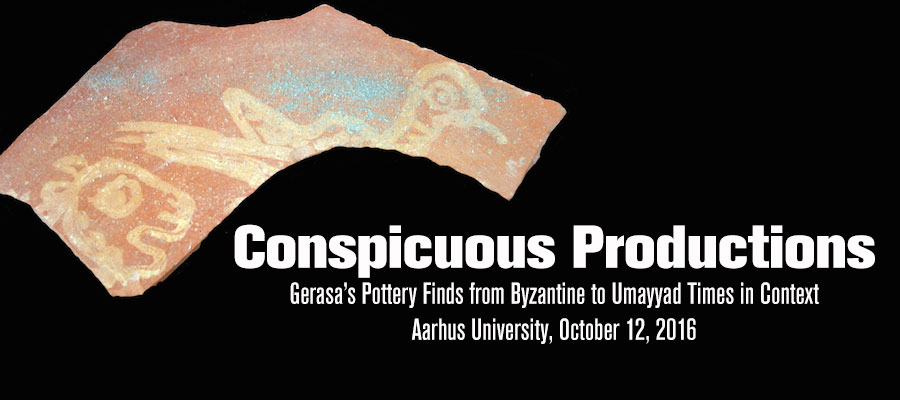Conspicuous Productions: Gerasa’s Pottery Finds from Byzantine to Umayyad Times in Context, Aarhus University, October 12, 2016
The most impressive remains of ancient Gerasa (Jerash) are the ruins of the city from Roman times. However, appearances are deceiving, and the Byzantine and Early Islamic times were the actual flowering periods with a peak in population numbers. A high amount of pottery production took place in this time, resulting in high quantities of finds during the last 100 years of excavation. The transition from Byzantine to Umayyad times takes center stage in the one-day conference within the frame work of the Danish-German Northwest Quarter Project and the collective research project Ceramics in Context. It aims at bringing together scholars working in the fields of pottery and archaeometric studies to discuss methods and latest research on this time of transition and continuation.
Research over the past years has shown that the period from Byzantine to Umayyad times is, according to its material culture, rather affected by persistence than discontinuity. Yet, can we determine any characteristics that are typical for either one or the other period of time? Are there features as different type variations or fabrics that occur only during the time of transition and mark it as an independent phase?
With an interdisciplinary approach and integration of methods from the natural sciences, existing chronologies for the Byzantine and Umayyad period shall be re-thought and discussed during the workshop, taking promising contexts as case studies. Regarding locally produced wares, archaeometric analyses will come to the fore. Is it possible to standardise local fabric descriptions? What can we say about form and function of vessels when we take their fabrics into account?
Also more general socioeconomic questions will be discussed. What, for example, was the reason for the high pottery production in Jerash? Which level of distribution did the production reach in regional or even supra-regional networks? Were the vessel produced for a micro- or macro-market exchange?
The workshop is set up as platform for exchange, offering the possibility for discussion in a “table ronde” among pottery specialists from archaeology and geosciences, focusing on different aspects of ceramics from various contexts of Byzantine to Umayyad Gerasa.
Registration required. Registration closes October 3, 2016.
